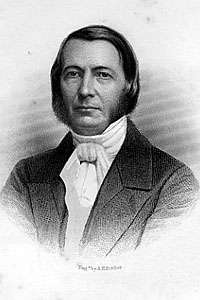James Henley Thornwell

James Henley Thornwell (December 9, 1812 – August 1, 1862) was an American Presbyterian preacher and religious writer from the U.S. state of South Carolina during the 19th century. During the American Civil War, Thornwell supported the Confederacy and preached a doctrine that claimed slavery to be morally right and justified by the tenets of Christianity.[1]
Early life and education
Born in Marlboro County, South Carolina, on December 9, 1812, Thornwell graduated from South Carolina College at nineteen, studied briefly at Harvard, then entered the Presbyterian ministry starting at the Waxhaw Presbyterian Church.[2] He became prominent in the Old School Presbyterian denomination in the south, preaching and writing on theological and social issues. He taught at South Carolina College, eventually served as its president, and went on to teach at Columbia Theological Seminary. He was a contemporary of Charles Hodge and represented the southern branch of the Presbyterian church in debates on ecclesiology with Hodge.
Career
When the American Civil War broke out, Thornwell supported the Confederacy. He founded the Southern Presbyterian Review, edited the Southern Quarterly Review, and had a prominent role in establishing the Presbyterian Church in the Confederacy. Thornwell preached the first sermon and wrote the first address for the new denomination.
As a supporter of the Confederacy, Thornwell held the view that slavery was morally right and justified under the Christian religion. He accused those who viewed slavery as being morally wrong, namely the Republicans, as being opposed to Christianity:
The parties in the conflict are not merely abolitionists and slaveholders. They are atheists, socialists, communists, red republicans, Jacobins on the one side, and friends of order and regulated freedom on the other. In one word, the world is the battleground – Christianity and Atheism the combatants; and the progress of humanity at stake.— James Henley Thornwell, [1]
Death
Thornwell died on August 1, 1862, after a long struggle with tuberculosis. Thornwell is buried in Elmwood Cemetery, Columbia, Richland County, SC.
Legacy
Thornwell, in the words of Professor Eugene Genovese, attempted "to envision a Christian society that could reconcile-so far as possible in a world haunted by evil-the conflicting claims of a social order with social justice and both with the freedom and dignity of the individual."[3]
See also
References
- 1 2 Rhea, Gordon (January 25, 2011). "Why Non-Slaveholding Southerners Fought". Civil War Trust. Civil War Trust. Archived from the original on March 21, 2011. Retrieved March 21, 2011.
- ↑ Appletons' annual cyclopaedia and register of important events of the year: 1862. New York: D. Appleton & Company. 1863. p. 669.
- ↑ Eugene Genovese, “James Henley Thornwell and Southern Religion” in Abbeville Review, May 5, 2015. Online at http://www.abbevilleinstitute.org/review/james-henley-thornwell-and-southern-religion/
Bibliography
- Thornwell, James Henley. The Collected Writings of James Henley Thornwell, 4 vols. Edited by John B. Adger and John L. Girardeau, 1871-1873.
- Thornwell, James Henley. The Rights and Duties of Masters: A Sermon Preached at the Dedication of a Church Erected in Charleston, S. C., for the Benefit and Instruction of the Coloured Population (1850).
- Palmer, B.M. The Life and Letters of James Henley Thornwell, 1875. online reprint
Further reading
- James Henley Thornwell and the Theological Defense of Slavery (1851-54) by Erik Grayson, History and Religious Studies Major, University of South Carolina. Vimeo video (10:01 minutes). A pdf of the text is available here.
External links
- The Collected Writings of James Henley Thornwell, Volume 1——Theological. (678 pdfs)
- The Collected Writings of James Henley Thornwell, Volume 2——Theological and Ethical. (634 pdfs)
- The Collected Writings of James Henley Thornwell, Volume 3——Theological and Controversial. (830 pdfs)
- The Collected Writings of James Henley Thornwell, Volume 4——Ecclesiastical. (648 pdfs)
- The Rights and Duties of Masters: A Sermon ... by James Henley Thornwell. (1850, 56 pdfs)
| Religious titles | ||
|---|---|---|
| Preceded by The Rev. Charles Hodge |
Moderator of the 59th General Assembly of the Presbyterian Church in the United States of America (Old School) 1847–1848 |
Succeeded by The Rev. Alexander T. McGill |